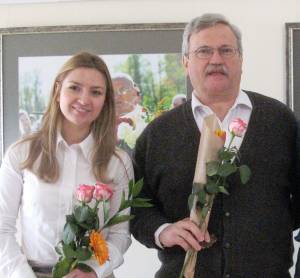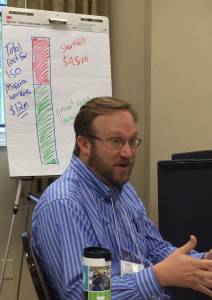A letter from Eric and Becky Hinderliter in the U.S., on interpretation Assignment from Lithuania
August 2015
Write to Eric Hinderliter
Write to Becky Hinderliter
Individuals: Give to E200361 for Eric and Becky Hinderliter’s sending and support
Congregations: Give to D506434 for Eric and Becky Hinderliter’s sending and support
Churches are asked to send donations through your congregation’s normal receiving site (this is usually your presbytery).
This summer, while in the United States, we have focused on two themes during our “interpretation assignment”: gratitude and strangers. We have visited 22 Presbyterian congregations and presbyteries since we arrived in the U.S. in early May. Our goal is to create and enhance our relationship with Presbyterian congregations, to be claimed as their mission co-workers. We have been warmly welcomed on our summer journey. Romans 15:7 says, Welcome one another therefore, just as Christ has welcomed you, for the glory of God. We enjoyed the hospitality of old friends in mission; we were invited to new congregations for the first time. We saw the mission focus of the Presbyterian Church (U.S.A.) at its best. We expressed our gratitude for the support we have received: we said often, “If your remember nothing else, please remember that we said thank you!” Our attitude as mission workers is one of gratitude.

Becky gets a big hello at First Presbyterian, Granville, Ohio.
We are frequently asked two questions by fellow Presbyterians. The first is, ”How is education ‘mission’?” The answer can be found in the new book by two theologians from the Donetsk Christian University in eastern Ukraine. “The evangelical churches in the FSU (the “former Soviet Union”) today need not only ‘professional Christians’ (i.e., pastors, missionaries, evangelists, etc.) but also ‘Christian professionals’ (i.e., doctors, nurses, lawyers, entrepreneurs, architects, journalists, broadcasters, etc.) who are able to bring their Christian perspectives into these spheres” ( Joshua T. Searle & Mykhailo N. Cherenkov [2014], A Future and a Hope: Mission, Theological Education, and the Transformation of Post-Soviet Society, p. 56-57). We couldn’t agree more with their insight that if society is to be transformed, Christian professionals, working out in the world, are vital to the task. As in medical missions, where the mission focus has shifted from sending physicians to do the actual surgery to training locals to be the surgeons, so we are not doing hands-on development ourselves but we are training locals to lead the process of development themselves. We as ex-pats could never match their local awareness and cultural sensitivity. This shift to enabling and empowerment leads to more effective mission practice.

Eric with Ana Potoroca from Moldova who wrote her senior thesis about economic change in post-Soviet states.
We were invited to preach at seven congregations this summer. Our text was the story of the road to Emmaus (Luke 24:13-34) as a metaphor for mission. We call this the possibilities of strangers. We first learned to read this story as a missionary tale from missiologist Anthony Gittins, back in 2001 during our initial mission training as we were being commissioned by the Presbyterian Church (U.S.A.). Jesus’ actions and thoughts serve as a model for mission workers. On the road Jesus first appears as a stranger; the disciples do not recognize him. But Jesus accepts this role as stranger, as outsider—and uses this status both to question the disciples and then to explain the meaning of events of Jesus’ passion. The disciples Jesus encounters on the road were discouraged, defeated—and without hope. The saddest verse in the Bible, we think, is “But we had hoped he was the One…” (Luke 24:21). But Jesus helps the disciples understand that his suffering was ‘necessary.’ The events of Easter signified victory, not defeat. As a stranger, Jesus first listens and then enables the disciples to “see” differently as only a stranger could do.
Do we recognize Jesus with us on our journey? Can we see ourselves as strangers? As teachers we encounter students from the former Soviet Union who are discouraged, who see no possibility of change in their society. As in many other parts of the world, they see corruption, face weak economies, and see a church that is compromised by nationalism filled with self-serving people. Hope for change is dimmed by harsh reality. One bright young lady from Moldova, Ana, a recent LCC graduate, told us about her society: The education system in the former USSR countries is rotten and everyone knows it. In Moldova, corruption is so bad that even our new prime minister has three fake diplomas, including the high school diploma. Everyone knows it, and nobody does anything about it. There is no way one can get a good education here. Corruption is indeed rampant. This year a banking scandal nearly ruined the country. Money worth nearly 15 percent of Moldova’s GDP was embezzled and the country is headed toward a recession. Hoped-for change has been derailed. Unfortunately Moldova is not unique and Ana is not alone when looking at the realities of post-Soviet society today.
Our role as mission workers—as strangers—is to offer students a word of hope that change is possible. We recall the words of I Peter 3:15: Always be prepared to give an answer to everyone who asks you to give the reason for the hope that you have. But do this with gentleness and respect. That’s our calling as Christians. In a discouraging world, we can give a reason for hope. The same student who complained about corruption in the education system came to realize that she could become an agent of change in her own country upon return. She writes: For instance, I am no longer willing to tolerate many things that are happening in our society, and I am trying to advocate for change among my friends and family, to start with.

Greg Allen-Pickett, general manager from PC(USA) World Mission, explains the 2016 shortfall in mission funding
The second question people asked this summer is, “When will you be back?” We say we don’t know. After 15 years as PC(USA) mission workers, we are entering a time of uncertainty. We hope for several more years in this work; our partner continues to suffer from an acute shortage of qualified faculty. Our ministry among students from former Soviet states is possible only with your gifts supporting mission through the Presbyterian Church. This year a major funding gap led to the recall of 11 mission workers, the first time this has happened in over 40 years. The funding gap projected for next year is even larger. Unless that gap is closed it will not be possible to keep the 162 presently deployed mission workers in the field. The only way to close the funding gap is through gifts given by local congregations and individuals. Several responses to the funding gap are worth considering. The circular letter from the PC(USA) moderator, Heath Rada, and others calls us all to a time of “fervent prayer and sacrificial giving”. Hunter Farrell, the director of World Mission in Louisville, perhaps says it best: “It’s up to us…the buck stops here; now it’s up to you and me. We can no longer rely on our parents’ generation to fund mission workers or hope ‘somebody else’ will.”
We now return to Lithuania. Friends, we invite you to walk along with us and the students we encounter daily through your fervent prayers and generous giving to Presbyterian mission. We have hope this will work out. “We live by faith, and not by sight” (II Corinthians 5:7).
Grace and peace,
Eric & Rebecca Hinderliter
The 2015 Presbyterian Mission Yearbook for Prayer & Study, p. 329
![]() You may freely reuse and distribute this article in its entirety for non-commercial purposes in any medium. Please include author attribution, photography credits, and a link to the original article. This work is licensed under a Creative Commons Attribution-NonCommercial-NoDeratives 4.0 International License.
You may freely reuse and distribute this article in its entirety for non-commercial purposes in any medium. Please include author attribution, photography credits, and a link to the original article. This work is licensed under a Creative Commons Attribution-NonCommercial-NoDeratives 4.0 International License.